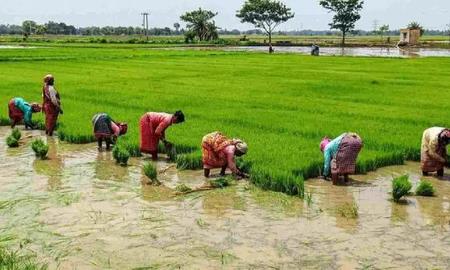
TN's Madurai Farmers In Distress As Rates Of Kuruvai Crops Fall In Open Market
The drop comes despite a better yield this season, leaving small and marginal farmers particularly distressed.
According to traders, two key factors have triggered the slump: a surge in paddy arrivals from Andhra Pradesh and Karnataka, and higher moisture levels in locally harvested grain caused by untimely rainfall.
Rice mill owners said that paddy with excess moisture has to be dried for nearly two months, significantly increasing processing costs. As a result, the procurement price is reduced to offset the additional expenditure. The availability of fine, dry paddy varieties from neighbouring states is also exerting downward pressure on local rates, they added.
Kuruvai paddy was cultivated in nearly 9,000 hectares in Madurai this season, similar to last year. With nearly 80 per cent of the harvest completed, farmers estimate that around 20 per cent of the total produce -- roughly 9,000 tonnes -- is being sold directly in the open market.
While Direct Procurement Centres (DPCs) offer Rs 25.5 per kg, traders in the open market are paying only Rs 23 per kg. At least one-fifth of the farmers, especially small cultivators, prefer to sell to traders despite the loss. They say traders arrive directly at the fields, offer instant payment, and avoid the long delays associated with DPCs.
Many farmers, under pressure to settle debts and cover labour charges, choose immediate clearance over higher returns.
Farmers reported a bumper harvest this year, with yields touching over 35 bags per acre compared to 30 bags last year. However, the price decline has neutralised the benefit.
At the Mattuthavani Central Paddy Market, traders confirmed that prices have fallen by Rs 2.5 per kg in recent days, with about 4,000 bags traded daily.
Rice millers noted that well-dried paddy can still fetch up to Rs 27 per kg, but much of the current season's produce carries high moisture content due to intermittent rains. Adding to farmers' worries, only 48 per cent of samba paddy in the delta region has been insured under the PM Fasal Bima Yojana, with just three days left for enrolment.
Farmers said they are unable to get the required documents as officials remain busy with the ongoing Special Intensive Revision (SIR) exercise.
The combined impact of falling prices, moisture-related deductions, rising milling costs, and insurance delays has cast a shadow over what should have been a profitable harvest season.

Legal Disclaimer:
MENAFN provides the
information “as is” without warranty of any kind. We do not accept
any responsibility or liability for the accuracy, content, images,
videos, licenses, completeness, legality, or reliability of the information
contained in this article. If you have any complaints or copyright
issues related to this article, kindly contact the provider above.


















Comments
No comment